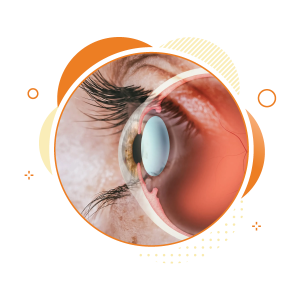Isha Netralaya | Best Eye Hospital in Maharashtra | Eye Specialist
Retina
Understanding About Retina Conditions
Retina conditions refer to problems affecting the retina, the thin layer of tissue at the back of the eye responsible for capturing light and sending visual signals to the brain. When the retina is damaged or affected by disease, it can lead to vision loss or blindness. Conditions like age-related macular degeneration (AMD), diabetic retinopathy, retinal detachment, and retinal tears are some common retinal problems. These conditions can develop due to aging, diabetes, injury, or genetic factors.

Types of Retina Conditions:
Causes loss of central vision, often related to aging.
Damage to the retina’s blood vessels due to diabetes, leading to vision issues.
When the retina pulls away from its normal position, a medical emergency that requires immediate treatment.
Small breaks in the retina that can lead to detachment if not treated.
Symptoms:
Central vision may become blurry or wavy.
Sudden flashes of light or floaters (spots) in your vision.
A significant or complete loss of vision in one or both eyes.
Blind spots or shadows in your field of vision.
Trouble seeing clearly in low-light conditions.
Treatment:
Used for conditions like retinal tears or diabetic retinopathy to seal retinal breaks or reduce abnormal blood vessels.
Anti-VEGF injections are used to treat wet macular degeneration and diabetic retinopathy by reducing abnormal blood vessel growth.
A surgical procedure to remove the gel-like vitreous in cases of retinal detachment or severe damage.
For conditions like retinal detachment, surgery is required to reattach the retina to its normal position.
Precautions:
Control blood sugar levels to reduce the risk of diabetic retinopathy.
Especially for individuals with risk factors like diabetes or a family history of retinal conditions.
Use sunglasses to prevent UV damage and wear protective eyewear during activities that may injure the eyes.
Eating a balanced diet and not smoking can help protect eye health
Before Surgery
Before retinal surgery, your doctor will perform a detailed eye examination, which may include imaging tests like optical coherence tomography (OCT) and fluorescein angiography to assess the condition of the retina. You may need to stop certain medications and use eye drops to reduce the risk of infection. Retinal surgery can vary in duration depending on the specific condition being treated but typically lasts between 1 and 2 hours under local or general anesthesia. The goal is to repair the damaged retina and preserve or restore vision.
During Surgery
During retinal surgery, you may be awake under local anesthesia, or asleep if general anesthesia is used. The surgeon will make tiny incisions in the eye to access the retina. Depending on the condition, the surgeon may use laser therapy, gas bubble placement, or a vitrectomy to repair the retina. The entire procedure is typically painless, though you might feel some pressure. After surgery, you’ll rest briefly before being allowed to go home, often with an eye patch or shield to protect the eye.
After Surgery
After surgery, your eye will be protected, and you’ll be prescribed eye drops to prevent infection and manage inflammation. Vision may be blurry or distorted at first, but it should improve gradually over several weeks. Recovery time varies based on the type of surgery and the condition treated, but full recovery usually takes a few weeks to a couple of months. You’ll need to avoid strenuous activities, especially anything that involves bending over or lifting heavy objects, and avoid rubbing your eyes. Follow-up appointments are important to monitor your healing and ensure that the retina is responding well to the surgery. Most people experience significant improvement in vision after recovery, though some may need additional treatment depending on the severity of the condition.
Isha Netralaya
As one of the leading eye hospitals in the heart of Thane, we take pride in our expertise in treating a varied range of eye problems.

LASIK Surgery
LASIK Surgery In Maharashtra

RETINA
RETINA Surgery In Maharashtra

CATARACT
Robotic Cataract Surgery

SQUINT
Specializes in Pediatric Squint

OCULOPLASTY
Best Oculoplastic surgeons in Thane

CORNEA
Advances Cornea Treatments in Thane

PEDIATRIC
Best Pediatric Ophthalmology Hospital

GLAUCOMA
Glaucoma Treatment In Maharashtra
Retina FAQs
Retina treatment refers to various medical and surgical procedures designed to address disorders and diseases affecting the retina, the light-sensitive layer at the back of the eye that is essential for vision.
? Common retina issues include retinal detachment, diabetic retinopathy, macular degeneration, and retinal vein occlusion. Each of these conditions can lead to vision loss if not treated promptly.
Symptoms of retina issues may include sudden loss of vision, flashes of light, floaters, blurred or distorted vision, or a shadow over your vision. If you experience any of these, it’s important to consult an eye specialist immediately.
Tests for retina problems include a detailed eye examination, Optical Coherence Tomography (OCT), fluorescein angiography, and B-scan ultrasonography. These tests help in diagnosing the condition and determining the right treatment.
Depending on the condition, treatments may include laser therapy, intravitreal injections, vitrectomy surgery, and cryotherapy. Your eye specialist will recommend the best treatment for your specific retina condition.




